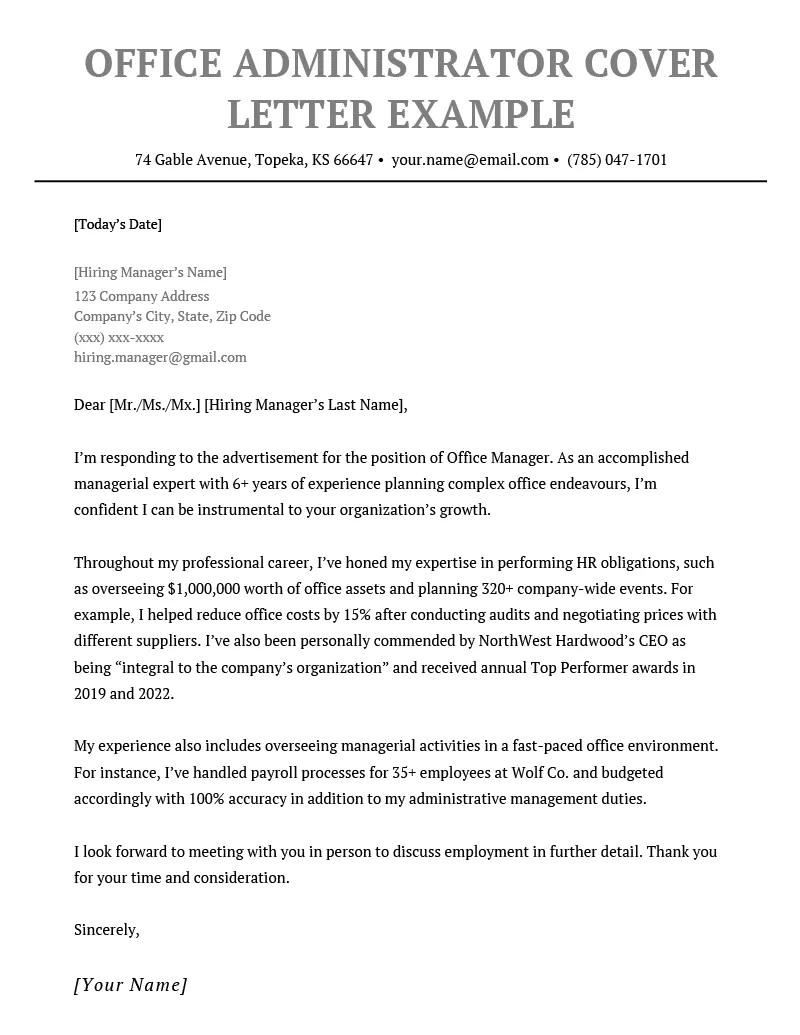What is a Cover Letter in Administration?
A cover letter is a crucial document accompanying your resume when applying for administrative roles. It serves as your introduction to a potential employer, providing a snapshot of your qualifications, skills, and experiences. Unlike a resume, which lists your professional history, a cover letter allows you to elaborate on your abilities and explain why you are the ideal candidate for the specific position. In the context of administration, a well-crafted cover letter showcases your organizational skills, attention to detail, and communication proficiency. It demonstrates your understanding of the role’s responsibilities and your enthusiasm for the opportunity. A compelling cover letter can significantly increase your chances of securing an interview, making it a vital component of any job application process in the administrative field. By carefully crafting your cover letter, you can highlight your key strengths and differentiate yourself from other applicants, ultimately increasing your chances of landing your dream job in administration.
The Purpose of a Cover Letter
The primary purpose of a cover letter is to persuade the hiring manager that you are a suitable candidate for the administrative position. It’s your chance to make a positive first impression and express your genuine interest in the role and the company. A well-written cover letter clarifies how your skills and experiences align with the job requirements outlined in the job description. It enables you to showcase your personality, communication skills, and enthusiasm, which can be difficult to convey solely through a resume. Furthermore, a cover letter provides an opportunity to explain any gaps in your employment history or career transitions. It’s also where you can highlight specific accomplishments, quantify your successes, and demonstrate your understanding of the company’s values and mission. Ultimately, the cover letter’s goal is to secure an interview by demonstrating your qualifications and showing that you are the right fit for the role and the organization’s culture. Crafting a compelling cover letter is a strategic step in the job application process.
Highlighting Your Skills and Experience
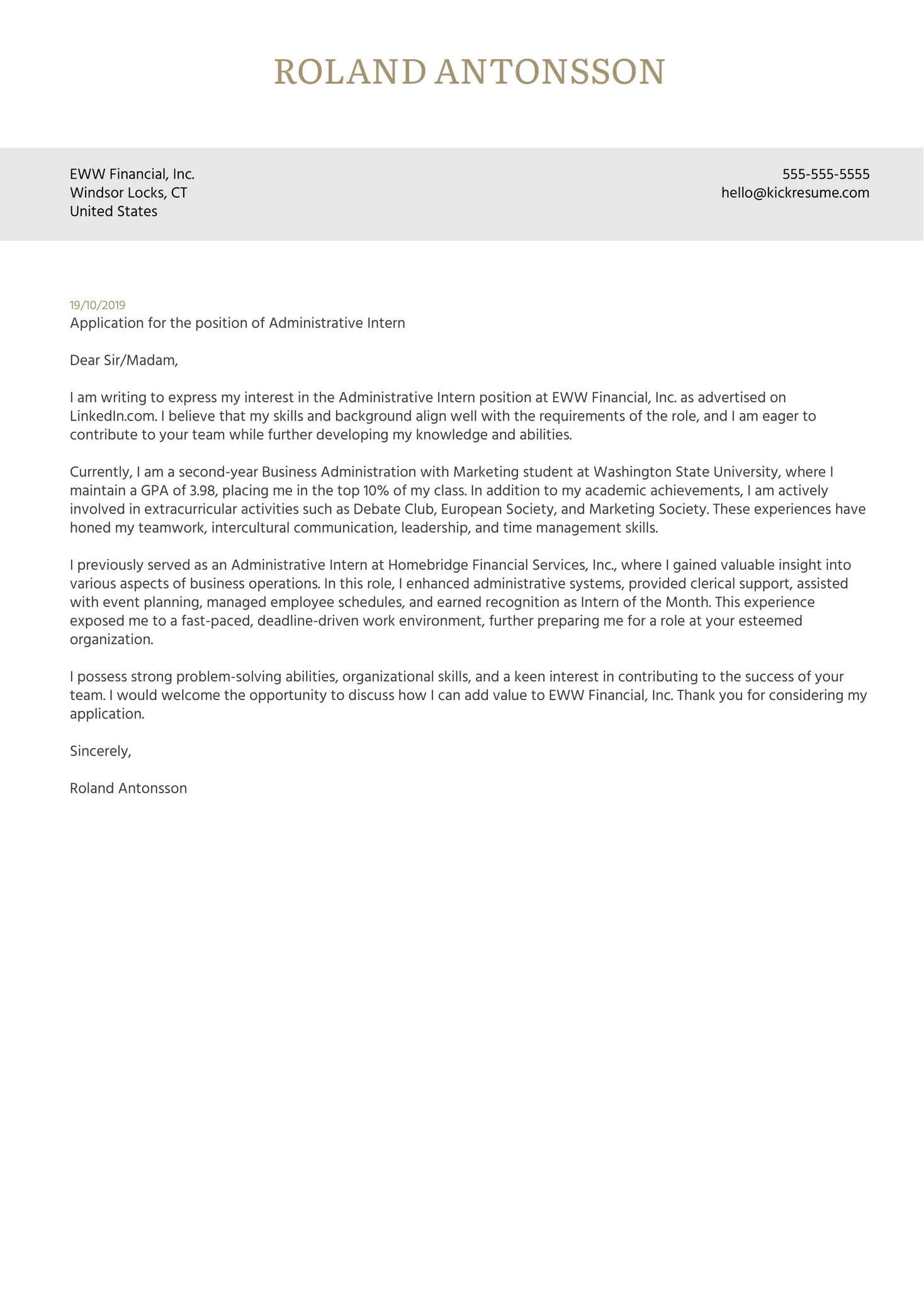
When writing your cover letter, it’s crucial to highlight the skills and experience most relevant to the administrative position. Begin by carefully reviewing the job description to identify the key requirements and keywords. Then, use specific examples from your past experiences to showcase how you’ve successfully demonstrated those skills. Quantify your achievements whenever possible. For example, instead of saying ‘Managed office operations,’ state ‘Managed office operations for a team of 20 employees, resulting in a 15% increase in efficiency.’ This demonstrates your capabilities and provides concrete evidence of your abilities. Focus on skills like organization, communication, time management, and problem-solving. Use action verbs to describe your accomplishments and responsibilities, such as ‘organized,’ ‘coordinated,’ ‘managed,’ ‘implemented,’ and ‘streamlined.’ Tailor your examples to the specific requirements of the job and avoid simply repeating what’s already on your resume. The goal is to paint a vivid picture of your abilities and how you can contribute to the company’s success.
Key Skills for Administrative Roles
Administrative roles require a diverse set of skills to ensure smooth operations and efficient support. Some of the most important skills include exceptional organizational abilities. Administrative professionals must be able to manage multiple tasks, prioritize deadlines, and maintain accurate records. Strong communication skills are also vital, as you will frequently interact with colleagues, clients, and vendors, both in writing and verbally. Proficiency in Microsoft Office Suite (Word, Excel, PowerPoint, Outlook) and other relevant software is crucial. A keen attention to detail is essential to ensure accuracy in all tasks, from data entry to document preparation. Time management skills are vital to balance competing priorities and meet deadlines. Problem-solving abilities are also valuable, as administrators often handle unexpected issues and find solutions. Discretion and confidentiality are also crucial, especially when dealing with sensitive information. Adaptability and a willingness to learn are vital, as the administrative landscape often changes. Finally, interpersonal skills enable effective collaboration and maintain positive working relationships.
Administrative Experience You Should Mention
When describing your administrative experience, focus on the tasks and responsibilities that align with the job requirements. Highlight experiences that demonstrate your ability to handle common administrative duties. Mention your experience with managing schedules, coordinating meetings, and handling correspondence. Include any experience you have with preparing reports, managing budgets, or processing invoices. If you have experience with customer service, emphasize your ability to handle inquiries, resolve issues, and provide excellent service. Detail your experience with organizing and maintaining files, both physical and digital. If you’ve worked with any specific software or systems, such as CRM or project management tools, be sure to mention those. Quantify your accomplishments whenever possible by providing specific data or metrics. For example, mention the number of projects you’ve supported or the percentage of time you reduced a specific task. Emphasize any experience you have with streamlining processes or improving efficiency within an office environment. Choose the experience that best demonstrates your value to the employer.
Crafting a Compelling Cover Letter
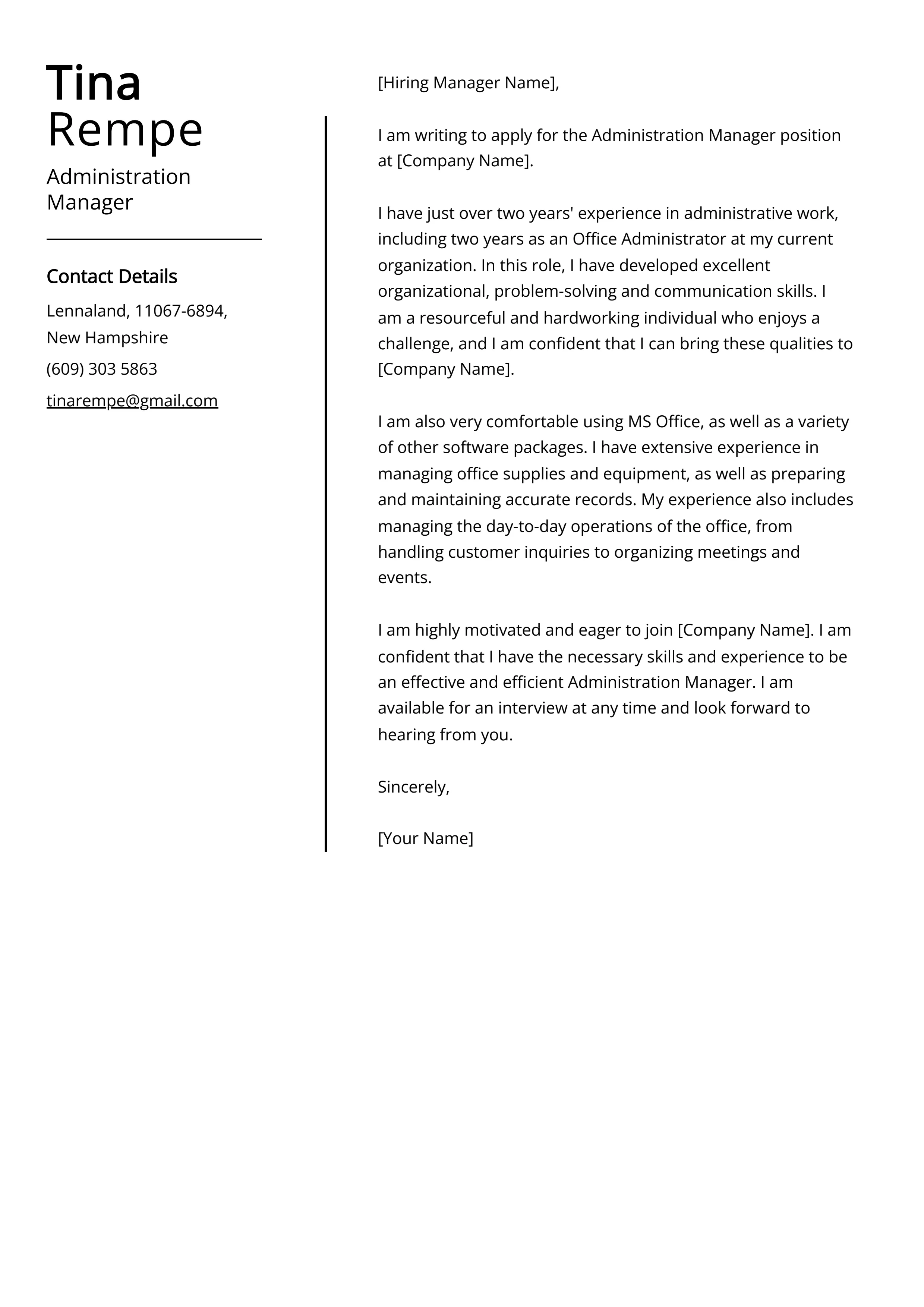
Structure and Format
A well-structured cover letter is clear, concise, and easy to read. Begin with your contact information, followed by the date and the hiring manager’s name and address, if available. Open with a professional greeting, such as ‘Dear Mr. / Ms. [Last Name].’ The body of your cover letter should be divided into three to four paragraphs. The first paragraph should state the position you’re applying for and briefly explain why you are interested in the company. The following paragraphs should highlight your relevant skills and experience, providing specific examples to demonstrate your capabilities. The final paragraph should reiterate your interest in the role and express your availability for an interview, including a call to action. Use a professional font, such as Times New Roman or Arial, with a font size between 10 and 12 points. Keep the letter concise, ideally no more than one page long. Ensure proper spacing, use bullet points to highlight key information, and use headings to break up long blocks of text. Proofread carefully for any errors in grammar and spelling.
Content and Tone
The content and tone of your cover letter should be professional and enthusiastic. Use clear and concise language, avoiding jargon or overly complicated sentences. Showcase your personality, but maintain a professional demeanor. Express your genuine interest in the role and the company. Focus on what you can offer the employer and how your skills align with their needs. Use action verbs to describe your accomplishments and responsibilities. Tailor your letter to the specific job requirements and avoid using a generic template. Demonstrate your understanding of the company’s mission, values, and industry. Highlight any achievements or contributions that demonstrate your ability to make a positive impact. Show your eagerness to learn and grow within the company. Proofread for tone, ensuring it is not too casual or informal. Maintain a positive and confident attitude throughout the letter, and make it reflect your professionalism and work ethic. The right tone will show you are a good fit for the job.
Tailoring Your Letter to the Job
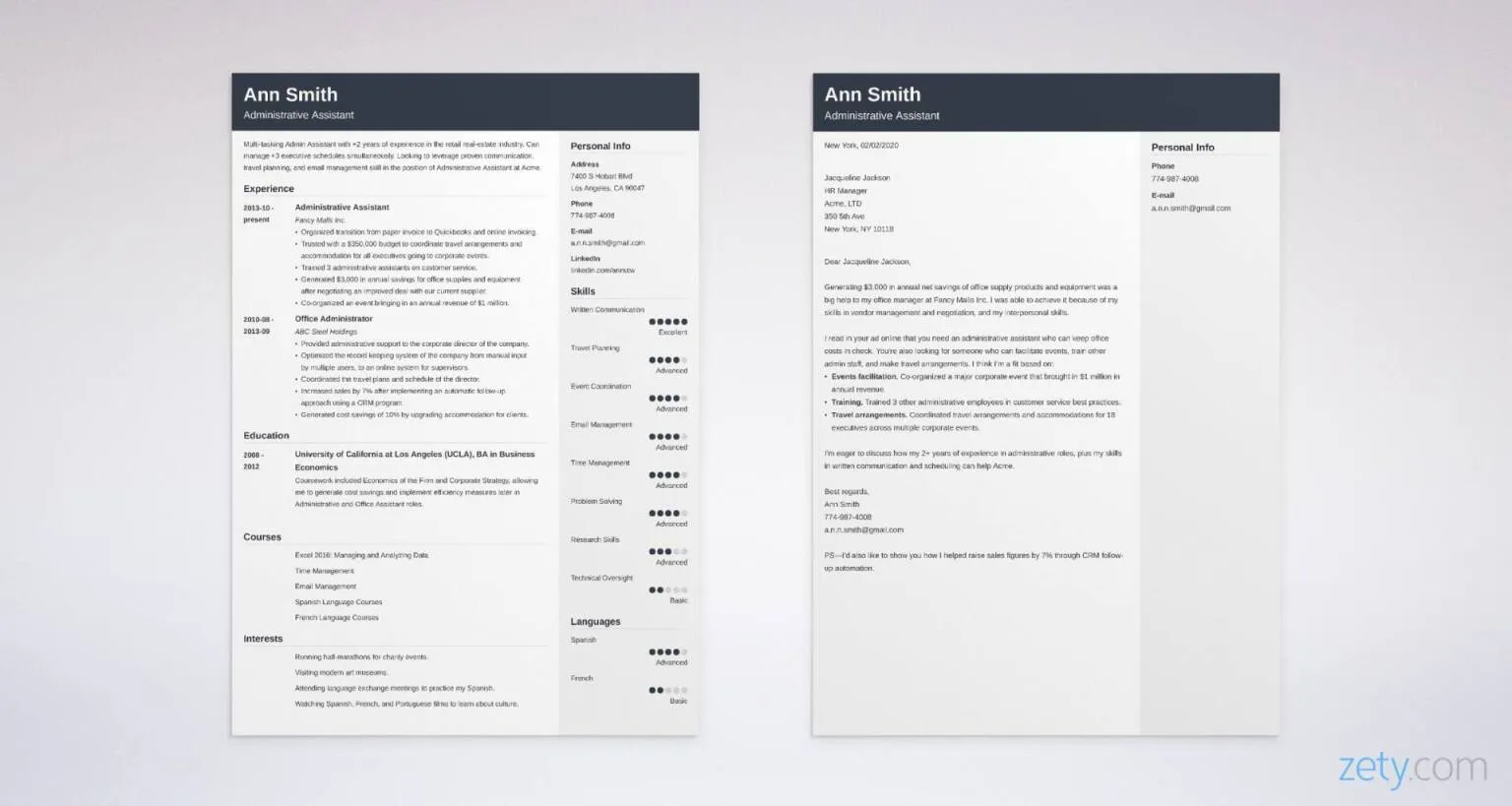
Customizing your cover letter for each job application is essential. Carefully review the job description to identify the key skills, experience, and qualifications the employer is seeking. Modify your cover letter to highlight the specific aspects of your experience and skills that are most relevant to the position. Use the same keywords and phrases that are used in the job description. Address the specific needs and challenges of the role and explain how you can help the employer. Mention specific examples that align with the job requirements. If possible, research the company and mention any projects, initiatives, or company values that resonate with you. Show your understanding of the company’s mission and culture. Avoid sending a generic cover letter; instead, demonstrate your genuine interest in the specific opportunity. Take the time to tailor your letter to each application to make a strong impression and increase your chances of getting an interview. The effort you put in to create a unique cover letter is a strong indication of your commitment.
Researching the Company
Before you begin writing your cover letter, research the company to gain a better understanding of its mission, values, and culture. Visit the company’s website to learn about their products, services, and recent news. Read their ‘About Us’ page and look for any information about their company culture, mission statement, and values. Search for the company on LinkedIn and other social media platforms to learn more about their employees and the company’s activities. Check online review sites, such as Glassdoor, to get insights into the company’s work environment. Look for any recent press releases or news articles about the company. Use this information to tailor your cover letter, demonstrating your understanding of the company’s goals and how your skills and experience align with their needs. Mention specific projects, initiatives, or values that resonate with you. This research will show the hiring manager that you are genuinely interested in the company and have taken the initiative to learn more about it. This can significantly improve your chances of securing an interview.
Matching Skills to Requirements
A crucial step in crafting a compelling cover letter is to match your skills and experience to the requirements outlined in the job description. Thoroughly review the job description, identifying the key skills, qualifications, and experiences that the employer is seeking. Make a list of these requirements and then reflect on your own skills and experiences. For each requirement, provide a specific example from your work history or education where you demonstrated that skill or experience. Use the same keywords and phrases used in the job description to ensure that your cover letter aligns with the employer’s expectations. Quantify your achievements whenever possible by providing specific data or metrics to demonstrate the impact of your contributions. Tailor your examples to the specific needs of the role and avoid generic statements. By clearly demonstrating how your skills and experience meet the job’s requirements, you can convince the hiring manager that you are the perfect fit for the administrative position. This will boost your chances of being selected for an interview.
Proofreading and Editing
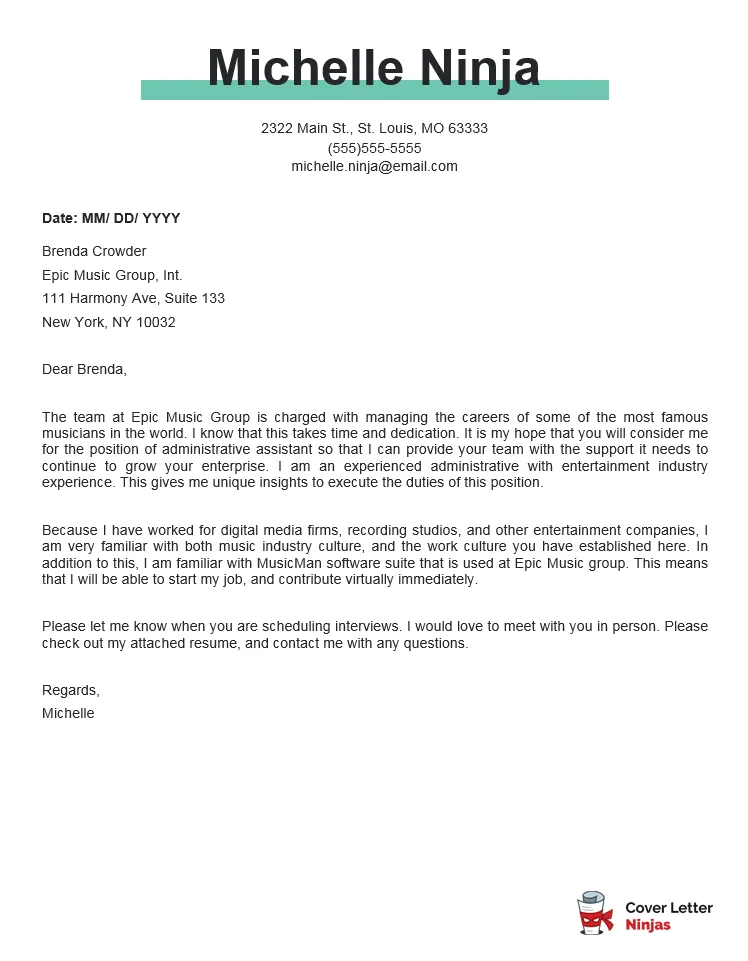
Proofreading and editing your cover letter is a crucial step in the job application process. Errors in grammar, spelling, or punctuation can undermine your credibility and make you appear unprofessional. Before submitting your cover letter, take the time to carefully review it for any mistakes. Use spell-check and grammar-check tools to identify potential errors. Read your cover letter out loud to catch any awkward phrasing or inconsistencies. Ask a friend, family member, or career counselor to review your letter and provide feedback. Pay close attention to the tone of your writing and make sure it is professional and enthusiastic. Ensure that the formatting is consistent and that all the information is accurate. Consider the overall impression your cover letter makes and make any necessary revisions to strengthen your message. Thorough proofreading and editing demonstrate your attention to detail and commitment to quality, which are essential qualities for any administrative professional. A well-written, error-free cover letter can significantly enhance your chances of landing an interview.
Common Mistakes to Avoid
Overly Generic Language
One of the most common mistakes in cover letters is using overly generic language. Avoid using clichés, buzzwords, and vague statements that don’t provide any specific information about your skills and experience. For example, instead of saying ‘I am a hard worker,’ provide a specific example that demonstrates your work ethic, such as ‘I consistently met deadlines and exceeded expectations on all projects.’ Avoid repeating information from your resume verbatim. Instead, use the cover letter to elaborate on your achievements and provide additional context. Tailor your cover letter to the specific job requirements and avoid using a generic template that could be used for any position. Highlight your unique skills and experiences and explain how they align with the employer’s needs. Show your personality and enthusiasm, and demonstrate your genuine interest in the role and the company. Using specific and compelling language is key to making your cover letter stand out and securing an interview.
Typos and Grammatical Errors
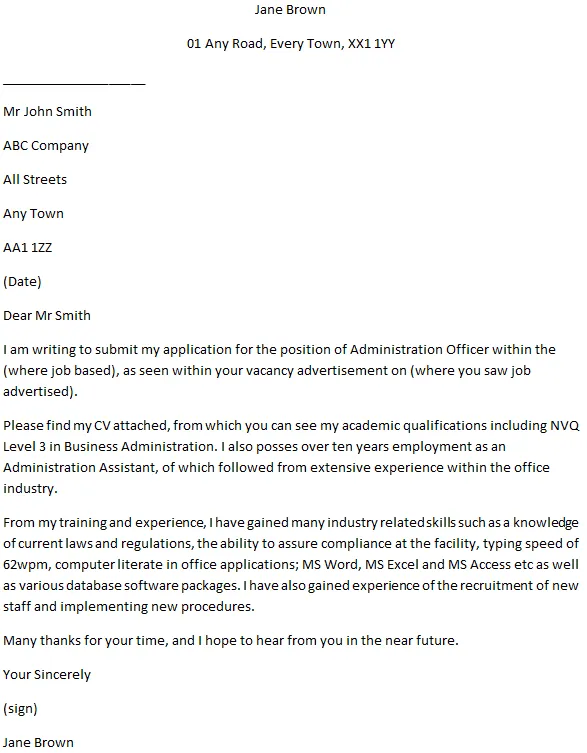
Typos and grammatical errors can severely damage your chances of landing a job. Proofreading and editing your cover letter is essential to ensure that it is free from any mistakes. Double-check all the details, including the hiring manager’s name, the company name, and the job title. Carefully review your cover letter for any spelling errors. Use spell-check and grammar-check tools to identify potential mistakes, but don’t rely on them entirely. Read your cover letter out loud to catch any awkward phrasing or inconsistencies. Ask a friend, family member, or career counselor to review your letter and provide feedback. Ensure that your cover letter is formatted correctly and that the spacing, font, and margins are consistent. Pay attention to the tone of your writing and make sure it is professional and enthusiastic. Proofreading your cover letter demonstrates your attention to detail and your commitment to quality, which are essential qualities for any administrative professional. A well-written, error-free cover letter will show the hiring manager your professionalism.
Length Considerations
Keeping your cover letter concise and focused is critical for capturing the hiring manager’s attention. The ideal length for a cover letter is one page. Avoid including unnecessary information or rambling on about topics that are not directly related to the job. Focus on the most relevant skills, experiences, and qualifications. Keep your paragraphs short and to the point, and use clear and concise language. When possible, use bullet points to highlight key information and make your letter easier to read. Tailor your cover letter to the specific job requirements and avoid trying to include everything from your resume. Be selective about the information you include and choose the examples that best showcase your abilities and accomplishments. Proofread your cover letter carefully to ensure that it is free from any unnecessary words or phrases. A well-crafted, concise cover letter will demonstrate your respect for the hiring manager’s time. It will also increase the likelihood that they will read it and consider your application.
Finalizing and Submitting Your Cover Letter
Before submitting your cover letter, review it one final time to ensure that it is error-free and tailored to the specific job requirements. Double-check all contact information, including your email address and phone number. Verify the hiring manager’s name and the company address. Proofread your cover letter for any typos, grammatical errors, or inconsistencies. Make sure that the format is professional and easy to read. Confirm that you have included all the necessary documents, such as your resume. Send your cover letter as a PDF file to preserve the formatting. If the job application specifies a particular method of submission, follow those instructions carefully. After submitting your cover letter, follow up with the hiring manager after a week or two, unless the job posting specifies otherwise. This demonstrates your continued interest in the position. A well-finalized and professionally submitted cover letter leaves a positive impression and increases your chances of securing an interview.
